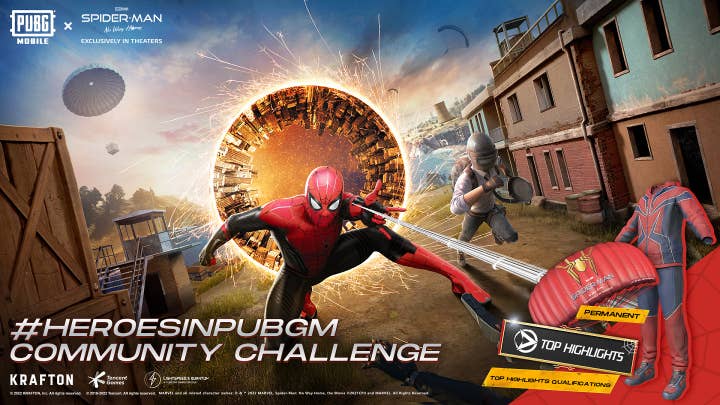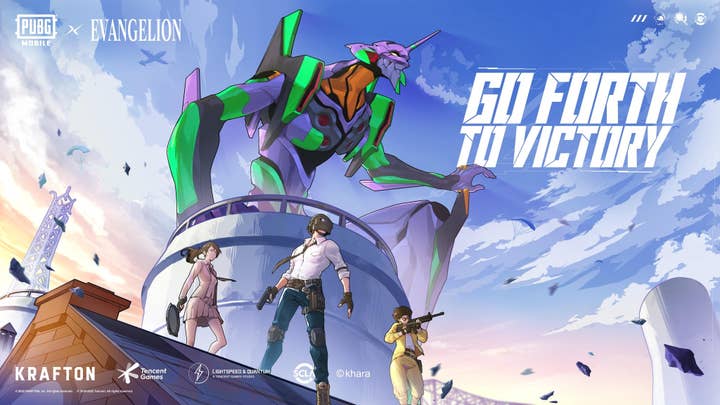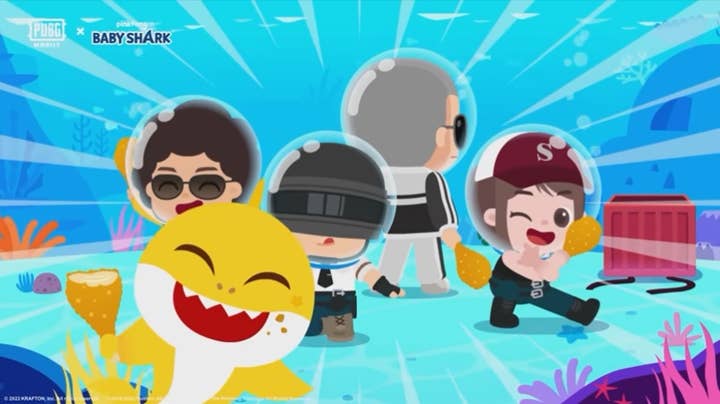What makes a good PUBG Mobile brand collaboration?
Tencent Games' Vincent Wang explains how the winner-take-all battle royale plays nicely with others
While the battle royale genre is based around a Highlander-esque "There can be only one" concept, the genre has evolved to play quite well with others, producing a handful of high-profile hits marked by frequent brand collaborations.
PUBG Mobile is one such example. In the little over four years since it launched, PUBG Mobile has featured collaborations with films, TV series, musicians, automotive brands, sports teams, other video games, soft drinks, and Baby Shark. Twice.
Speaking with GamesIndustry.biz recently, Tencent Games head of PUBG Mobile publishing Vincent Wang says the process behind these collaborations has shifted considerably.
"When launching PUBG Mobile just over four years ago we almost always opened the conversation with brands for potential collaboration," Wang says. "However, now I'd say it's about 50-50 between us pitching brands versus receiving requests."
"A good collaboration is one that's designed with both fans of the existing games as well as fans of the new IP in mind"
It helps that the company is building relationships with the brand owners, many of whom hold a variety of different properties that could be used as future crossovers. Of course, each campaign also has to make sense on its own.
"A good collaboration is one that's designed with both fans of the existing games as well as fans of the new IP in mind," Wang says. "Through the design, construction and delivery process you have to strike the right balance, staying within what existing players like while also respecting the IP that you are taking inspiration from."
That often -- but not always -- involves adding new gameplay elements.
"It's really great to introduce new lore, but collaborations give an amazing and unique opportunity to completely switch up gameplay systems without alienating existing players," Wang says.
Another part of the collaboration game that has changed is the idea of exclusivity. The days of one publisher holding all the video game rights to a popular character or brand are long since numbered, and brand-holders are overlapping collaborations as their cross-media marketing campaigns crescendo with the launch of a tentpole movie. For example, Spider-Man: No Way Home had events in both PUBG Mobile and rival battle royale game Fortnite during its theatrical run.

"Exclusive partnerships are very rare in current times as brands across all industries know that video game partnerships are great and will return value," Wang says. "It's now not necessarily a competition to earn an exclusive partnership with a big brand. Instead, it's a competition on who can do it best. Games are now marked on how in-depth the collaboration is. Is it only a few new cosmetics being introduced, or is it a full-scale gameplay change?
"It's now not necessarily a competition to earn an exclusive partnership with a big brand. Instead, it's a competition on who can do it best"
"With our [League of Legends animated Netflix series] Arcane partnership, for example, they partnered with a number of different games, but we focused on using the IP to deliver a completely unique gameplay experience around it. It was received really well by the community and stood out from some of the other games Arcane partnered with.
"This approach is how games stand out from each other in the age of collaboration. When approaching collaborations now, we try to really think how far we can explore the new world, its exciting characters, stories and battles. When PUBG Mobile partnered with Godzilla vs Kong in early 2021, we again wanted to stand out and do something really special. We actually completely recreated the epic final battle from the movie, in-game, with players becoming a key part of defeating Mechagodzilla."
Brands are also becoming increasingly comfortable with the idea of gaming collaborations, Wang says.
"PUBG Mobile players, and gamers more broadly, are more brand loyal than the average consumer and much more receptive if you speak to them in the right way, which is by adding value to their experience over just straight advertising," he says. "You can see just by the volume of partnerships we've had over the past year how comfortable brands are now with video game collaborations. We've worked with brands from almost every industry. The numbers we can show as an industry are very persuasive, as are those we can show to our partners following a successful collaboration."
He adds, "In 2022 most brands' understanding of what basic elements make a good partnership is pretty solid. We now spend much less time discussing things such as what individual cosmetics to include, as brands already come to the table with clear ideas. This is great as it means we can focus more time and energy on what bigger ideas we can create and deliver."
Despite the aforementioned Baby Shark campaigns, we ask if the realistic/military motif in PUBG Mobile has presented a challenge for some partners, whereas the more stylized look of Fortnite could conceivably be more palatable to brands.
"[T]he game is not overly violent and doesn't glorify it, so PUBG Mobile is very brand safe in that"
"You mentioned the military motifs in PUBG Mobile, but the game is not overly violent and doesn't glorify it, so PUBG Mobile is very brand safe in that," Wang says. "Because of that, we've been able to partner with everyone from Tesla to Line Friends to French Haute Couture fashion design Julien Fournié.
"Our key focus is on player expression, and because of that, we can always work with creative and eclectic brands like Julien Fournié or Zaha Hadid Architects, as it just adds new and interesting ways players can express themselves. That is one of the main keys to PUBG Mobile's success, giving players plenty of options for self-expression."
However "brand safe" PUBG Mobile is, the game has also been banned in a number of markets over the years, with authorities citing concerns about children becoming addicted and behaving violently as reasons for curbing the game.
"PUBG Mobile operates in a huge number of markets, and we're very aware of how video games are viewed by some," Wang says. "We're also very aware of the responsibility that we have in helping protect younger people from issues that can come from excessive video game playing, from physical health issues and beyond.
"Health and safety of our players are paramount to us. What we can do, and are doing, is list everything that PUBG Mobile does to ensure that we're a net positive in young people's lives. We've introduced a gameplay management system to limit time played in certain markets, worked to fully comply with local laws and regulations in every market we operate in, and led or supported a number of community projects, such as the WHO's PlayApartTogether initiative or the Play as One campaign to support the Direct Relief Foundation. None of these things directly affect our user growth or revenue, but are essential in our goal to be a socially responsible brand."

Those bans are also a reminder that every market is distinct, and can respond differently to the same content or promotion. For that reason, Wang says PUBG Mobile has both worldwide collaborations as well as those specific to certain markets, like the Japan-specific crossover with the anime series Black Lagoon, or the Middle East Crew Unknown promotion starring Egyptian comedian Mohamed Henedi.
"Delivering the best experience to everyone sometimes means understanding and respecting regional differences..."
"Delivering the best experience to everyone sometimes means understanding and respecting regional differences, sometimes by creating different collaborations in different places," he says. "PUBG Mobile does a mix of the two, depending on a lot of factors such as the size of the IP, the scale of the changes it will make to the game, and also what the IP actually is. A movie releasing globally, a regionally popular series, or an automotive plan -- each of these may require a different approach."
When looking at the future of brand collaborations in games, it's natural to consider how it dovetails with the notion of the metaverse many companies are currently pursuing. After all, the most broadly understood vision of the metaverse in pop culture has been Steven Spielberg's Ready Player One adaptation, which was notable as much for the deluge of intellectual properties involved as it was for the movie itself.
"Brand crossovers are inherently related to the concept of the metaverse, which is very abstract right now but clearly linked to the idea of multiple brands, companies and IPs coming together to broaden what their users can access and engage with," Wang says.
So as someone who has been laying groundwork toward that vision, what would Wang say to those who want to make it a reality?
"The advice I'd extend is the same advice that has helped grow PUBG Mobile to where it is," he says. "Focus on delivering the best possible value to your players, either through fun and engaging content or varied opportunities for self-expression. Building a space that people really want to come back to, socialize in, and engage with, will be the key to their success."


